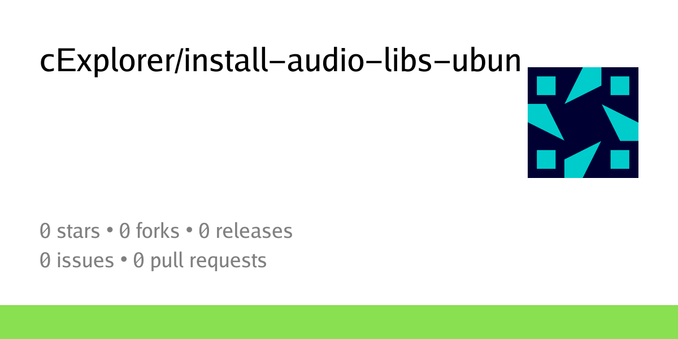Recent searches
Search options
#pulseaudio
In order to run Ardour on Linux you do NOT need the following things:
- JACK
- PipeWire
- PulseAudio
Use Linux' native drivers called ALSA and off you go.
P.S. You can't watch YouTube anymore when using ALSA with Ardour. Never watched YouTube on my guitar so personally I don't mind.
Nimm #pipewire, haben sie gesagt. Damit wird alles einfacher, haben sie gesagt.
Naja, man ist da sicher auf einem guten Weg. Aber das Jonglieren mit config Dateien und Einstellungen erinnert mich doch etwas daran, wie es vor reichlich zehn Jahren war, wenn man #jack und #pulseaudio zusammenbringen wollte.
Zwar muss jetzt nicht soo viel konfiguriert werden, aber man muss schon ein wenig herumsuchen...
Mit meinem install #Script für das #Audio Zeug hab ich es nun ohne jack versucht. Mal sehen ob es sich mit #ubuntu 24 #Linux bewährt:
https://codeberg.org/cExplorer/install-audio-libs-ubuntu
Dankbar bin ich für Ideen dazu und für Hinweise auf Fehler.
#Ardour #DAW #LinuxAudio

Save 68% on Liikkuva string textures for Kontakt by Pulse Audio https://rekkerd.org/liikkuva-string-textures-by-pulse-audio-sale/

I've got audio working on MuseScore4 + Void Linux! A little summary of what I did (for myself and anyone else on #linux needing #MuseScore 4)
I first switched to #pipewire. For me, this involved uninstalling #pulseaudio and jack, then installing the packages `pipewire alsa-pipewire`. This differs on other distros. I needed to verify that pipewire was starting up properly. Since I didn't have a login manager, I had to set the XDG_RUNTIME_DIR variable manually and also create that directory everytime I booted. Using `tmp` instead of `run` worked better for me.
Then I followed these steps: https://docs.voidlinux.org/config/media/pipewire.html#alsa-integration to get #alsa integration going. Restart, then that's it!
MuseScore now has audio
I made a no-dependency client library for PulseAudio in zig called Pulsar. I just released version 0.1.0 https://codeberg.org/desttinghim/pulsar/src/tag/0.1.0
#zig #linux #pulseaudio #programming #opensource
#PipeWire 1.4.0 has been released (#PulseAudio / #JACK / #JACKAudio / #ALSA / #AdvancedLinuxSoundArchitecture / #GStreamer / #SoundServer / #SoundSystem / #AudioLinux / #VideoServer / #VideoSystem / #VideoLinux / #MultimediaFramework / #FreeDesktop / #RedHat) https://pipewire.org/
Yet another #debian #linux installation and yet another frantic search for how to remove #pipewire and revert back to #pulseaudio It could be that I'm just getting old & and grumpy, but all these new-fangled, untested & backward-incompatible solutions for problems that don't exist are really beginning to get on my nerves.
Pipewire (or, more accurately, its use of Pulse) has been problematic for some time, often selecting an HDMI output rather than stereo audio via the on-board sound device, then I found this somewhere (didn't note where):
load-module module-remap-sink sink_name=stereo-downmix master=alsa_card.pci-0000_2a_00.4.analog-stereo channels=6 master_channel_map=front-left,front-left,front-right,front-right,front-left,front-right channel_map=front-left,center,center,front-right,rear-left,rear-right
Change the ‘master’ parameter to match your hardware (as I did, using the PCI address of the on-board HD audio controller), stick that line in /etc/pulse/default.pa (or, presumably, ~/.config/pulse/default.pa), restart the sound server and all should be well.
Save 88% on Ink Audio Everything Bundle for Kontakt https://rekkerd.org/ink-audio-everything-bundle-for-kontakt-sale/
Just wondering if there are any #linux users around with good experience with #pulseaudio .
Having an issue with some headset mics where the audio keeps dropping out from optimal 50-60% down to 25-30% and therefore having to re-adjust the mic volume in pulse audio volume control all the time. However I set it, it keeps dropping down.
@aeva Maybe #Wine will implement MS MIDI to Wine when this is done...
At the moment MIDI is done via #Pulseaudio which bricks almost all MIDI devices in Wine...
I've been using Linux on my desktop for nearly 30 years and i still don't understand how to get sound working properly and reliably.
Searching for some kind of distro-agnostic 2025 Linux audio general best practices guide... What should I be using (ALSA, jack, pulse, pipewire?), how can I configure multiple sound devices (onboard, HDMI, USB, Bluetooth), set my preferred inputs and outputs and levels on each, toggle between them properly, and have those settings persist after logout, reboot, or removal/addition of devices?
En gestionbaire de son, à la place de #pulseaudio qui merde beaucoup, il y a #pipewire.
linuxmao.org/PipeWire
Hello  je cherche de l'#aide pour configurer le mode passtrougth de mon #kodi21 sous linuxmint 21.3 vers mon ampli Denon AVR-X520BT.
je cherche de l'#aide pour configurer le mode passtrougth de mon #kodi21 sous linuxmint 21.3 vers mon ampli Denon AVR-X520BT.
Après avoir essuyer pas mal de déboires avec #pulseaudio, j'ai bien du son qui sort via le passtrougth, mais c'est un bruit moche quelque soit le format de son du film (AC3, AAC, DTS).
Auriez vous une idée s'il vous plaît ?
Le repouet fait vombrir les caissons de basse.
I just had to remove #pipewire :( Upgrading to #Fedora 40 resulted in nonworking sound. Back to #pulseaudio .
Interestingly, my other computer upgraded fine and I play games with pipewire now.
#Ubuntu Studio 22.04 To 24.04 Upgrade Breaks Due To #PipeWire And #PulseAudio Conflict
Ubuntu Studio users are experiencing widespread failures when attempting in-place upgrades from 22.04 LTS to 24.04 LTS. The root cause appears to be a conflict arising from the optional switchability between PipeWire and PulseAudio sound servers in Ubuntu Studio 24.04.
Alert: Ubuntu Studio 22.04 To 24.04 Upgrade Breaks Due To PipeWire And PulseAudio Conflict #Ubuntustudio #Ubuntu #Pipewire #Pulseaudio #Upgrade
https://ostechnix.com/ubuntu-studio-22-04-lts-to-24-04-lts-upgrade-issue/
Bin grad betriebsblind...
Wie kann ich Audio bei #Linux direkt von der Soundkarte in eine Datei schreiben? Es geht ums legale Mitschneiden von Webradio, Audiospuren eigener Videos oder von eigenen Vorträgen.




